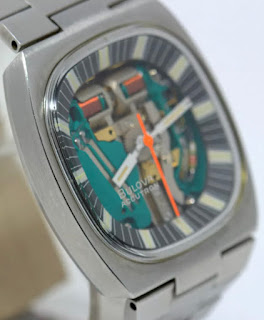I have always wanted a Bulova
Accutron space view. The Bulova Space view comes in a varieties of shapes and
it also comes in solid gold, gold filled and stainless steel. Owing to the popularity and high demand of the
Accutron space view, there are many Accutron that come with “conversions” in the market. As such,
collector’s recommendation is to only buy a chapter ring Spaceview online.
In the end, my key criteria for the choice of the
Accutron has to be Big, and it has to have a chapter ring and in stainless steel
and with the early caliber 214. This is a Vintage Rare Oversized Accutron T Model
Triple Cushion 15 Jewel Tuning Fork Cal. 214 complete with original metal bracelet. This is a bigger jumbo
size space view. Do you know an Accutron does not tick but hummmm.. Always
nice to put the watch to your ear and listen to the hum.
Despite the Covid 19 Locked down, my Bulova accutron has arrived HK safely! The watch consition is much nicely then the seller's photos. The watch size is just nice as the jumbo size also fit today's trend. As it comes with the original metal bracelet, it make it more complete.
Every discerning collector should have at least one tuning fork caliber with the retro-cool look.
Spaceview "Triple
Cushion" Oversized Model
The case shape, the inner
bezel chapter track and the Crystal are all three in the cushion shape) Even though ALL Spaceview T models are quite
scarce, most all of the oversized Accutron Spaceview T models are Not Triple
Cushion!
What's an Accutron ? (and
SPACE Connections)
The Bulova Accutron was the
world's first electronic watch. People sometimes refer to the Accutron as the
worlds first electric watch. This isn't quite true but as it was the first to
use a bipolar transistor it certainly deserves the former accolade. The first
Accutron was manufactured in 1960 and was the watch chosen by some of the
'Original Seven' NASA astronauts to
accompany man on his first journeys into space. Scott Carpenter famously
modeled a Bulova Accutron 'Astronaut' on the front cover of Paris Match in
1962. Contrary to popular myth the Accutron only flew in space a couple of
times on the wrist of an astronaut. It was not the watch chosen by NASA as the
astronaut flight qualified time piece, this accolade goes to the Omega
Speedmaster Professional. The Omega however was never (except in Apollo 13)
used as the primary reference for any mission critical activities. Accutron
movements were used in panel clocks and as instrument timers. Even today there
is still an accutron tuning for keeping time on the moon
'Tuning Fork Watches'?
The watch
uses a tuning fork as its prime moving element. It is a well understood
physical principle that the faster your initial reference the more accurate
your time keeping will be. The most accurate clocks nowadays use the vibrations
of a caesium atom as their reference. In the 1950s the best mechanical watches
could rely on a prime moving element with a frequency of around 2 Hz (That is
two 'beats' per second). Max Hetzel an engineer employed by the Bulova Watch
Company of Bienne Switzerland designed an electrically excited tuning fork
movement with a a frequency of 360 Hz. Bulova claimed an accuracy of 2sec per
day or 1 min per month. This was the only movement capable of the accuracy demanded by
spaceflight. Accutrons were used as time references in many satellites and also
to control some of the Apollo moon experiments.The Tuning Fork Movement is
absolutely unique in operation emitting a distinctive hum and featuring a sweep
seconds hand. Here's a reproduction of an advertisement produced by Bulova in
the early 1960s.
The Case
A vintage "Future
Modern" classic one of the largest spaceview watches at 36.25mm, and 43mm
Lug tip to lug tip.Like the case main Fully
signed screw down case back in Stainless Steel
The Dial
Again a classy crisp with no
signs of wear, these spaceviews are so cool that you can see and hear them
working. with original white Tuning fork hands which stand out against its
complex electromechanical background ,
The Movement
Bulova 214
Features
- electronically controlled tuning fork
- sweep second
- 15 jewels
- f = 360Hz
According to collector David
J Rudary, The first spaceviews were made without chapter rings and were made
for advertising purposes as one member said. They "caught on" and
Bulova ended up producing over 2,000,000 214 models during the 60's into the
70's. In all of Bulova's career with Accutrons they produced over 5,000.000 of
these units! The chapter ring models (214) have the chapter ring seated into
the bezel area located by a pin on the chapter ring that mates with a drilled
blind hole in the bezel. There are a lot of imitations out there and one sure
way to detect them are:
1. The hands (they must be white and the finish will be
"pebble like" when magnified.
2. Be sure the second hand where the post
is rivited is not filled with paint for that's a sure indicator someone
refinished the hand.
3.The crystal size is another indicator for there were only
specific case sizes the spaceviews were made to. The first modles were made to
fit a 29.0 mm crystal, then they progressed up the popular 29.9 mmm. Both sizes
had the chapter rings applied to the inside face of the crystal along with the
Accutron name at below the 12:00 position with the Accutron logo at the upper
most 12:00 position. The applied crystal must be crisp and clear for the
immitations are mot crisp and some are really close but upon magnification one
can spot the differences. There are several sizes above these as well
To buy the battery:
Please read these links for more information on the Bulova Accutron :















No comments:
Post a Comment